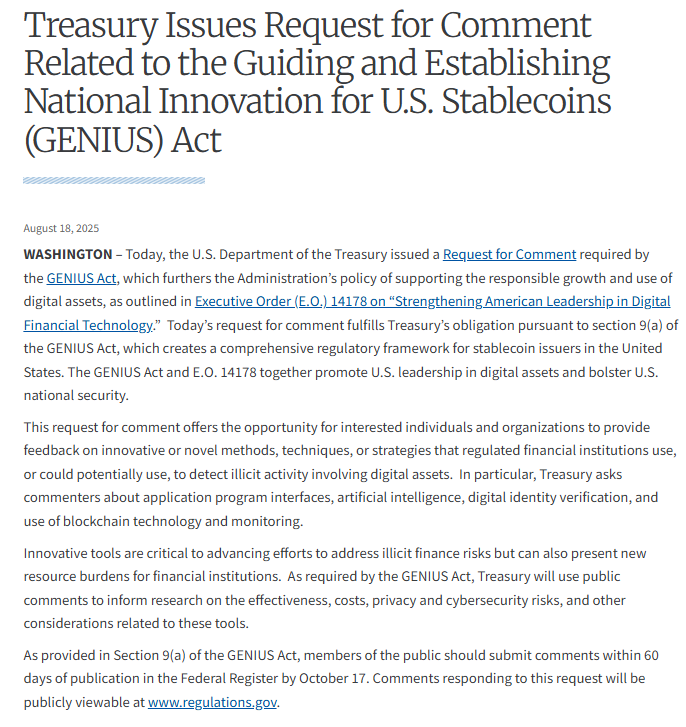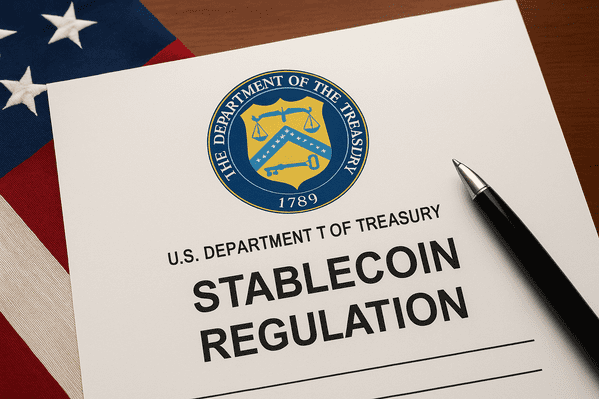The US Treasury Department opened a public comment period for the Guiding and Establishing National Innovation for US Stablecoins (GENIUS) Act.
The law was signed by President Donald Trump on July 18, 2025. Comments are due by October 17, 2025.

According to the notice, the Treasury invited “individuals and organizations” to submit feedback on ways to detect and stop illicit finance linked to digital assets. The department emphasized that the request is required under the GENIUS stablecoin bill.
In an X post, Treasury Secretary Scott Bessent called the request “essential” for carrying out the GENIUS Act and said it would help secure leadership in the digital asset sector.
GENIUS Stablecoin Bill Targets Illicit Finance Risks
The GENIUS stablecoin bill directs the Treasury to gather input on detecting illegal uses of crypto, including money laundering.
The notice specifically asked for feedback on application programming interfaces (APIs), artificial intelligence (AI), digital identity verification, and the use of blockchain monitoring tools.
After receiving public comments, the Treasury will review the proposals and prepare reports. These will be submitted to the Senate Banking Committee and the House Financial Services Committee for further consideration.
The GENIUS Act sets a timeline requiring the law to take effect 18 months after July 18 or 120 days after Treasury and the Federal Reserve complete regulations, whichever comes first.
Implementation Timeline of GENIUS Act
The implementation period means that the GENIUS stablecoin bill will begin enforcement closer to 2027.
The timing places its rollout beyond the 2026 midterm elections. Treasury officials noted that the phased timeline provides time for both regulatory drafting and technical input from the public.
The law is one of the first federal acts regulating payment stablecoins. It establishes requirements for issuance, collateral management, and internal control systems.
Both the Treasury and the Federal Reserve will oversee compliance once final rules are approved.
Stay ahead in the crypto world – follow us on X for the latest updates, insights, and trends!🚀
GENIUS Stablecoin Bill and Other Crypto Legislation
The GENIUS stablecoin bill is part of a broader set of laws moving through Congress.
During “crypto week” in July 2025, the House of Representatives passed three bills with bipartisan support:
-
The GENIUS Act regulating stablecoins
-
The Digital Asset Market Clarity (CLARITY) Act
-
The Anti-CBDC Surveillance State Act
The CLARITY Act and the Anti-CBDC bill have been sent to the Senate, which is currently in recess until September.
Senate Banking Committee leadership has said it plans to prioritize crypto market structure. The committee also intends to pass its version of the CLARITY Act by October 2025.
GENIUS Act Requires Public Input on Stablecoin Oversight
The GENIUS Act specifically requires public participation to design oversight tools.
The Treasury’s notice stressed the importance of input on monitoring stablecoin transactions through blockchain-based systems, AI models, and identity verification solutions.
Officials confirmed that these inputs will form the basis of Treasury’s compliance reports.
The information will be shared directly with lawmakers to guide enforcement under the GENIUS stablecoin bill.
Disclosure:This article does not contain investment advice or recommendations. Every investment and trading move involves risk, and readers should conduct their own research when making a decision.
Kriptoworld.com accepts no liability for any errors in the articles or for any financial loss resulting from incorrect information.

Tatevik Avetisyan is an editor at Kriptoworld who covers emerging crypto trends, blockchain innovation, and altcoin developments. She is passionate about breaking down complex stories for a global audience and making digital finance more accessible.
📅 Published: August 19, 2025 • 🕓 Last updated: August 19, 2025


